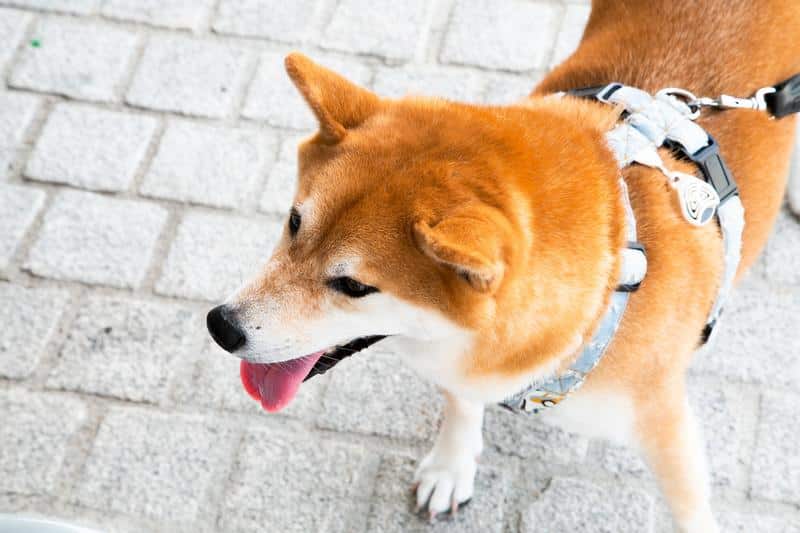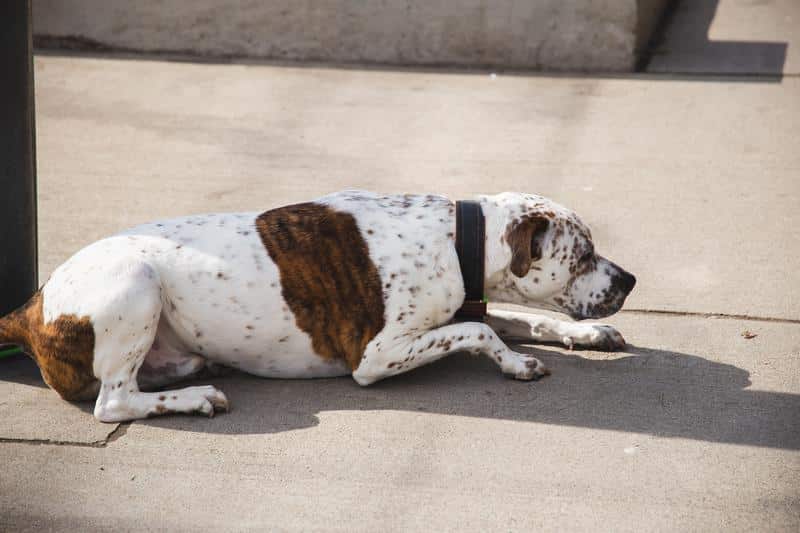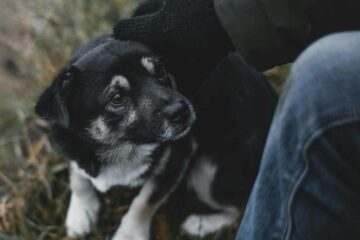Why Does My Dog Poop on Concrete Instead of Grass? (+How to Stop!)
“Why does my dog poop on concrete instead of grass?” If you’ve found yourself asking this question, you’re in the right place. This article will dive into the reasons your dog may prefer hard surfaces over grass and provide tips on how to stop your dog from pooping on concrete.
If you’re in need of some tips for cleaning dog poop from concrete, we’ve got you covered. We’ll also address some special cases, like why your old dog has suddenly started pooping on concrete, or why your dog prefers the sidewalk, street, or driveway over the yard. Keep reading below!
Why Does My Dog Poop on Concrete Instead of Grass?

Your dog poops on concrete instead of grass due to personal preference, past experiences, or just because they find the surface easier to use. This behavior can also be learned, especially if the dog was initially raised in an environment without access to grass. Training can often correct this, but patience and consistency are important.
Understanding Dogs’ Surface Preferences
Just like humans, dogs can have personal preferences, and this extends to where they like to poop. Some dogs might prefer the solid feel of concrete under their paws and get anxious elsewhere, while others might feel more comfortable on grass.
This preference can also be shaped by their early experiences as puppies. If a dog was primarily exposed to concrete surfaces during its toilet training, it might carry that preference into adulthood. Learn how to stop your dog from pooping on concrete in the next section.
The Role of Scent Marking in Dogs’ Defecation Behavior
Dogs use their feces and urine to mark territory, communicating their presence to other dogs. Concrete, being a hard and smooth surface, might hold the scent of a dog’s poop longer than grass, making it an appealing choice for dogs looking to mark their territory.
Environmental Factors and Dog’s Pooping Habits
Environmental factors can also influence where a dog chooses to poop. For example, if the grass in a dog’s usual spot is too tall, wet, or contains bugs, the dog might opt for a cleaner, drier surface like concrete.
How to Encourage Your Dog to Poop on Grass
If you want to encourage your dog to poop on grass instead of concrete, consistency and patience are key. Start by taking your dog to the same grassy spot each time it needs to poop. Praise and reward your dog immediately when it poops on the grass. With time, your dog will associate pooping on the grass with positive rewards. We explain how to do this in the next section.
Stop Dog Pooping on Concrete

To stop a dog from pooping on concrete, one can follow a series of steps involving positive reinforcement training, establishing a consistent routine, and altering the environment. These steps aim to redirect your pet’s potty habits to more appropriate areas like grass or a designated spot.
- Positive Reinforcement Training: Train your dog using positive reinforcement, which involves rewarding them each time they poop in the correct area, such as a grass patch. Rewards could be treats, praise, or play. This strategy encourages them to associate pooping in the right place with positive outcomes.
- Establish a Consistent Routine: Dogs are creatures of habit and thrive on consistency. Establish a regular feeding and walking schedule to regulate your dog’s bathroom habits, which will reduce the chances of them needing to eliminate while in concrete areas.
- Change the Environment: If possible, prevent your dog’s access to concrete areas during their typical bathroom times. This might mean blocking off certain areas or guiding them towards grassy spots during their usual bathroom times.
These steps will get your dog to stop pooping on the concrete instead of grass, but it’s important to remember that the underlying behavioral issues (anxiety, marking, etc.) that were causing all of this to begin with will still be present. And until you address those, any positive changes you see are only going to be temporary.
“Well, how do I make these changes last?”
By getting your dog to truly choose to follow your direction, that’s how. I tried many times to write out how you can do this before deciding it made more sense to just link you to the free video series that explains it better than I’d ever be able to.
The series is by a man named Dan who is one of the world’s leading dog obedience trainers. In it, he teaches you how to put an end to things like when your dog poops on the concrete instead of the grass and all other misbehavior using his fast and easy-to-follow methods.
In the first video, Dan will reveal to you why the two most common methods of dog training only doom you to failure. You can watch the video now by clicking here. Follow the proven system he’ll show you in his series and you’ll never have to spend another second worrying about your dog pooping on the concrete ever again!
How to Clean Dog Poop From Concrete
Cleaning dog poop from concrete involves several steps such as immediate removal, initial cleaning, disinfection, and preventing future occurrences. Here is a step-by-step guide:
- Prompt Removal: As soon as you notice the poop, it’s important to remove it immediately to prevent stains and smells from setting in. Use a plastic bag or a poop scoop for this purpose to avoid direct contact.
- Initial Cleaning: Use a hose to wash away any residual waste. For stubborn stains, a scrub brush and warm soapy water will be more effective. Be sure to rinse thoroughly after scrubbing.
- Disinfection: After the initial cleaning, disinfect the area to eliminate any remaining bacteria and smell. There are pet-safe disinfectants available in the market. Follow the instructions on the label for application and leave it to soak as directed.
- Rinse and Dry: Rinse the disinfected area thoroughly with water to wash away the disinfectant. Allow the area to air dry.
- Prevent Future Occurrences: Consider training your dog to avoid defecating on concrete, or use deterrent sprays to discourage them from going in that area again.
Following these steps will help maintain a clean and sanitary environment in areas of your property where concrete is present. It is important to clean up dog waste promptly and properly for health and hygiene reasons, and to keep your outdoor spaces pleasant and usable. Learn how to prevent the behavior in the second section.
Until you address the problem properly, your dog’s issue is just going to get worse and continue popping up in the worst of spots. You’ll probably find your dog pooping in the closet, pooping in your shoes, pooping on your bed, pooping on your clothes, pooping in the bathtub… well, you get the idea. Go back to the second section to learn how to help.
Old Dog Pooping on Concrete
Older dogs may start pooping on concrete due to age-related health issues such as arthritis, reduced vision, or cognitive dysfunction. This behavior might be easier for them, or they might be unable to reach their usual grassy spot. It’s important to consult a vet if your old dog starts pooping on concrete suddenly, as it can be a sign of underlying health problems.
The Impact of Aging on a Dog’s Pooping Habits
As dogs age, their physical abilities and cognitive function can diminish. Arthritis might make it difficult for them to move comfortably on uneven surfaces like grass, leading them to choose the smoother, flat concrete. Reduced vision could also make it hard for them to navigate their way to the grass, especially in low light.
Cognitive Dysfunction Syndrome in Older Dogs
Cognitive Dysfunction Syndrome (CDS) is a condition in older dogs that is similar to Alzheimer’s disease in humans. Dogs with CDS might forget their house training rules and start pooping in inappropriate places, including on concrete. Other signs of CDS can include disorientation, changes in sleep patterns, and alterations in social interactions.
Urinary and Bowel Incontinence in Aging Dogs
Incontinence is another common issue in older dogs, which can lead to them pooping in unusual places. If your dog seems to be unaware that it’s pooping or if the pooping occurs during sleep or rest, it might be suffering from incontinence. This is a medical issue and should be addressed by a vet.
Consulting with a Veterinarian for Aging Dogs’ Defecation Changes
If your older dog starts to poop on concrete suddenly, it’s crucial to consult with a veterinarian. This change in behavior could signal a health issue that needs addressing. The vet can rule out or diagnose any medical conditions and suggest appropriate treatments or management strategies to help your dog.
Adjusting Your Approach for an Aging Dog
If your older dog’s preference for concrete is related to mobility issues or discomfort, consider making adjustments to make it easier for them. This could involve creating a flat, grassy area that’s easily accessible or using pet-friendly ramps to help them reach their preferred spot. Patience, understanding, and compassion are key when handling these changes in your aging dog.
Dog Suddenly Pooping on Sidewalk
When your dog suddenly starts pooping on the sidewalk, it could be due to a variety of reasons such as changes in routine, stress, fear, or medical issues. It’s important that you identify the cause and implement an appropriate solution to modify this behavior.
Identifying the Cause
- Change in Routine: Dogs thrive on routine and any disruption, like moving to a new place or a change in walking schedule, can lead to behavioral changes including where they choose to poop.
- Stress or Fear: Dogs may alter their pooping habits due to fear or anxiety. If the sidewalk is a new environment, or if it has been associated with a scary incident, they might poop there due to fear. Learn how to treat this in the second section.
- Medical Issues: Medical problems can cause sudden changes in a dog’s elimination habits. If your dog is suffering from gastrointestinal issues or other health problems, they might not be able to hold their poop until they reach their usual spot.
Addressing the Problem
- Re-establish Routine: Maintain a consistent walking schedule and try to encourage your dog to eliminate in the same spot. Positive reinforcement like treats or praises when they poop in the preferred spot can reinforce the behavior.
- Manage Stress: If the issue is due to fear or stress, gradual desensitization and positive reinforcement can be effective. This involves gradually exposing them to the fear-inducing situation while providing positive reinforcement to associate the situation with good things.
- Seek Veterinary Help: If you suspect a medical issue, seek veterinary help promptly. The vet can diagnose the issue and prescribe an appropriate treatment plan.
Understanding why your dog is suddenly pooping on the sidewalk is an important part of helping your canine friend to adapt and get back to their normal behavior. Learn how to do this by going back to the second section now.
Why Is My Dog Pooping on the Driveway?
Your dog is pooping on the driveway because of a variety of reasons including changes in their environment, habits, or health. This could be because it’s more comfortable or accessible, they’ve formed a new habit, or there’s a health concern causing them to alter their behavior. Addressing the issue involves identifying the cause and applying a suitable solution which can range from retraining to seeking veterinary care.
Possible Environmental Factors for Dogs Pooping on Driveways
If your dog has started to poop on the driveway, consider any recent changes in the environment. Have you altered the grassy area where they usually go? Is there more traffic or noise near their usual spot? A change in the environment can make the driveway seem like a more appealing option for your pet.
Changes in Your Dog’s Habits
Dogs are creatures of habit and once they start doing something, they can quickly form a routine. If your dog pooped on the driveway once—maybe due to an upset stomach or being unable to access their usual spot—and found it comfortable, they might continue to do so. Interrupting this habit might require retraining and positive reinforcement.
Health Issues That Might Cause Dogs to Poop on Driveways
If your dog is suddenly pooping on the driveway, it might be a sign of a health problem. Age-related health issues such as arthritis could make the driveway seem more appealing due to its flat surface. Health conditions like gastrointestinal upset might cause your dog to poop unexpectedly and the driveway is simply the nearest spot. It’s always wise to consult with a veterinarian if you observe sudden changes in your dog’s behavior.
Training Your Dog Not to Poop on the Driveway
To discourage your dog from pooping on the driveway, consider employing basic house training techniques. Monitor your dog closely and when you see signs that they need to poop, lead them to their usual spot. Reward your dog for using the correct spot to reinforce the behavior. Learn more about this process in the second section.
Why Does My Dog Poop in the Street?
Your dog poops in the street due to several factors such as habit, territory marking, or simply because it’s a convenient spot. Understanding the underlying reasons will help you effectively redirect this behavior.
Possible Reasons
- Convenience: Dogs don’t always discriminate about where they poop. If the opportunity arises when they are in the street, they may simply decide to go there.
- Territory Marking: Some dogs use their feces to mark territory. Pooping in the street might be your dog’s way of sending a signal to other dogs that they’ve been there.
- Habit: If a dog has been allowed to poop in the street previously, they may have formed a habit. They now view the street as an acceptable place to relieve themselves.
- Fear or Anxiety: A fearful or anxious dog might poop wherever they happen to be when the fear or stress response hits them. If this happens to be in the street, that’s where they’ll go. Learn how to treat this underlying issue in the second section.
Addressing the Behavior
- Regular Bathroom Routine: Establish a consistent routine for your dog’s bathroom breaks. Try to guide them towards appropriate places, away from the street.
- Positive Reinforcement: Reward your dog when they poop in the right place. Treats, praise, or a quick game can make them associate pooping in the right spot with positive experiences.
- Distract and Redirect: If you notice your dog getting ready to poop in the street, distract them and guide them to a more appropriate place. Over time, they’ll get used to going in the right spot.
As always, patience and consistency are key when dealing with any dog behavior. If the problem persists, you likely have an underlying problem that needs to be addressed. We explained how you can do this yourself in the second section of this article.
I’m sure you’re ready for your dog to poop on the grass and not the concrete anymore, so I’ll let you get started on things now. Good luck, and thanks for reading our article “Why Does My Dog Poop on Concrete Instead of Grass? (+How to Stop!)”.





